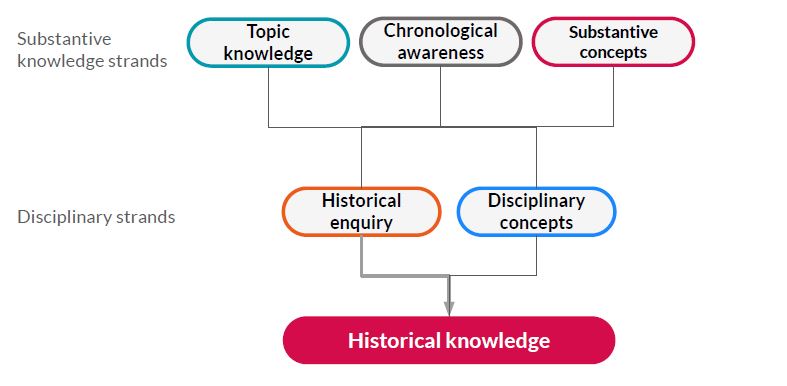History
Intent
Our Intent is to inspire pupils to be curious and creative thinkers, who develop a complex knowledge of local and national history and the history of the wider world. We want pupils to develop the confidence to think critically, ask questions, and be able to explain and analyse historical evidence. History will
support children to appreciate the complexity of people’s lives, the diversity of societies and the
relationships between different groups.
Our History lessons aim to support pupils in building their understanding of chronology in each year
group, making connections over periods of time and developing a chronologically-secure knowledge
of History. We hope to develop pupils’ understanding of how historians study the past and construct accounts and the skills to carry out their own historical enquiries.
Implementation
In order to meet the aims of the National curriculum for History and in response to the Ofsted Research review into History, we have identified the following key strands:
Our curriculum emphasises the importance of historical knowledge being shaped by disciplinary approaches, as shown in the diagram above. These strands are interwoven through all our History units to create engaging and enriching learning experiences which allow the children to investigate history as historians do. Each unit has a focus on chronology to allow children to explore the place in time of the period they are studying and make comparisons in other parts of the world.
In EYFS, children explore the concept of history by reflecting on key experiences from their own past, helping them understand that they each have their own histories. Then, they engage in activities to compare and contrast characters from stories, including historical figures, deepening their understanding of how individual lives fit into broader historical narratives. Children will further develop their awareness of the past in
Key stage 1 and will know where people and events fit chronologically. This will support children in
building a ‘mental timeline’ they can refer to throughout their learning in Key stage 2 and identifying
connections, contrasts and trends over time.
Over the course of the scheme, children develop their understanding of the following key disciplinary
concepts:
• Change and continuity.
• Cause and consequence.
• Similarities and differences.
• Historical significance.
• Historical interpretations.
• Sources of evidence.
These concepts will be encountered in different contexts during the study of local, British and world
history. Accordingly, children will have varied opportunities to learn how historians use these skills to
analyse the past and make judgements. They will confidently develop and use their own historical
skill set. As children progress through the scheme, they will create their own historical enquiries to study using sources and the skills they have developed.
Substantive concepts such as power, trade, invasion and settlement, are introduced in Key stage 1,
clearly identified in Lower key stage 2 and revisited in Upper key stage 2 (see Progression of skills
and knowledge) allowing knowledge of these key concepts to grow. These concepts are returned to
in different contexts, meaning that pupils begin to develop an understanding of these abstract
themes which are crucial to their future learning in History.
Impact
Pupil progress is monitored and tracked through:
• evidence in work books
• pupil voice
• subject leader monitoring: lesson drop ins, teacher voice, action plans and governor reports

